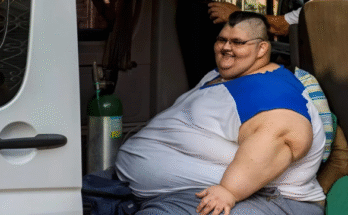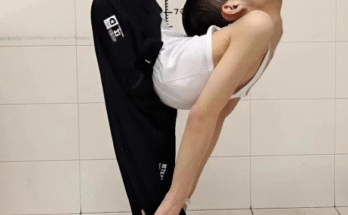
In the photo, we see a 28-year-old woman who once drew attention for her delicate features and radiant skin. Before pregnancy, friends often complimented her on her striking appearance. She herself enjoyed experimenting with makeup, taking photos, and feeling confident in her reflection. But everything changed when she became pregnant. Instead of the glow she had expected, she began to notice that her face was transforming in ways she couldn’t control. Her cheeks started to swell, her skin became unusually sensitive, and soon even her facial features seemed more pronounced and harsher.
Many acquaintances were shocked. Those who hadn’t seen her for weeks were surprised at how pregnancy could so dramatically alter a woman’s appearance. Some comments were well-meaning—questions like “Are you feeling okay?” or “Is everything normal with the baby?”—but others carried a tone of disbelief that only deepened her self-consciousness. For Farah Faizal, a young Malaysian woman, each passing month became a new test of endurance.

At first, the changes were subtle: a little redness here, a small pimple there. She thought it was just the usual hormonal flare-up that most pregnant women experience. But within a few weeks, the irritation spread. Painful inflammations appeared, and her once smooth skin looked rough and uneven. Makeup no longer covered the problem, and even gentle skincare products caused stinging or burning sensations. She recalls avoiding mirrors in the mornings because the reflection felt more and more unfamiliar.
The swelling added another layer of difficulty. Her face puffed up, especially around the cheeks and eyes. Wrinkles that had never been noticeable suddenly seemed deep and permanent. Even her nose and ears appeared larger, as if her entire facial structure was changing before her eyes. People who knew her from before sometimes struggled to recognize her. A few even whispered behind her back, questioning whether the woman in the “before” photos could really be her.
Doctors examined her carefully, worried that something more serious might be going on. Eventually, they suspected a rare form of rosacea—a severe inflammatory skin condition that can sometimes develop during pregnancy. It wasn’t just cosmetic; it caused real physical pain. Touching her face felt uncomfortable, and the constant sensitivity made simple things like washing or sleeping on her side difficult.

Farah describes those nine months as pure chaos. Not only was her body going through the typical challenges of pregnancy—back pain, fatigue, cravings—but she also carried the heavy burden of looking in the mirror and not recognizing herself. She often avoided social gatherings, too embarrassed by her appearance to face the curiosity or pity of others. Even stepping out to buy groceries sometimes filled her with dread, knowing that strangers would stare.
Yet through all of this, one person made the biggest difference: her husband. While Farah struggled with self-esteem, he remained her steady anchor. He reassured her daily that she was still beautiful, that these changes were temporary, and that her strength mattered more than her appearance. His words, though simple, gave her courage. In the darkest moments, when she felt like hiding from the world, his support reminded her that she was not alone.

Finally, after months of physical and emotional struggle, she gave birth to a healthy baby. With that moment came not only the joy of motherhood but also the beginning of her recovery. Slowly, almost imperceptibly, her skin began to heal. The angry red patches softened, the painful bumps flattened, and the swelling around her cheeks and eyes gradually went down. For the first time in months, she dared to smile at her reflection without flinching.
The process is not complete, and Farah admits there are still days when she sees traces of the ordeal on her skin. But compared to the months of pregnancy, she feels lighter, freer, and more like herself. Now, when she looks in the mirror, she recognizes the woman staring back—not just for her features, but for the resilience and strength those nine months revealed.
She says she’ll never forget how hard it was, but she also knows it gave her a deeper appreciation for her body and her life. The experience taught her that beauty is fragile and fleeting, but inner strength and love can carry you through the most difficult transformations. Today, she continues her recovery, holding her baby close, grateful not only for her improving health but also for the support that never left her side.
And when she compares her “before” and “after” photos, she no longer feels only sadness. Instead, she sees a journey—one that tested her but also showed her just how strong she could be.


